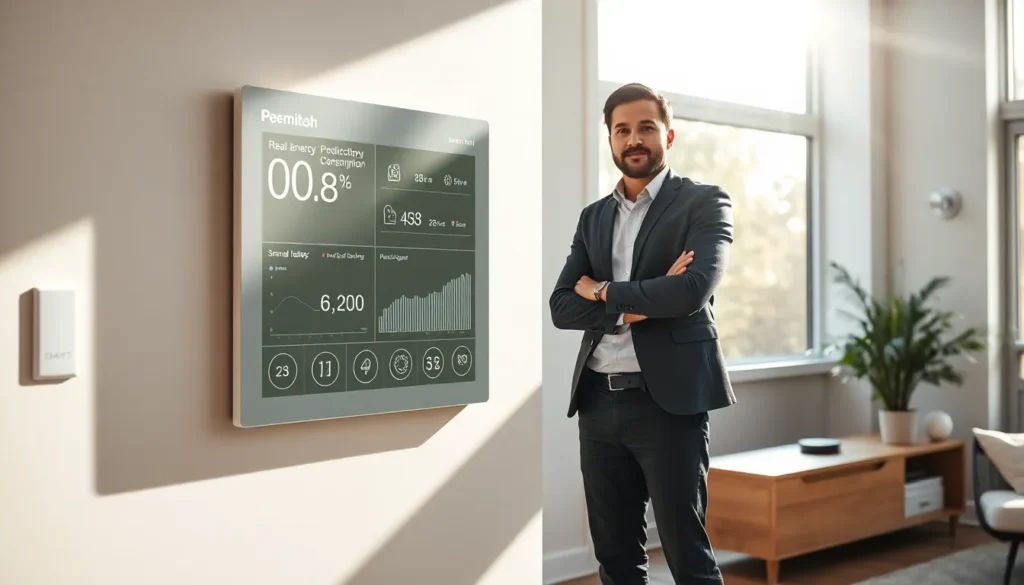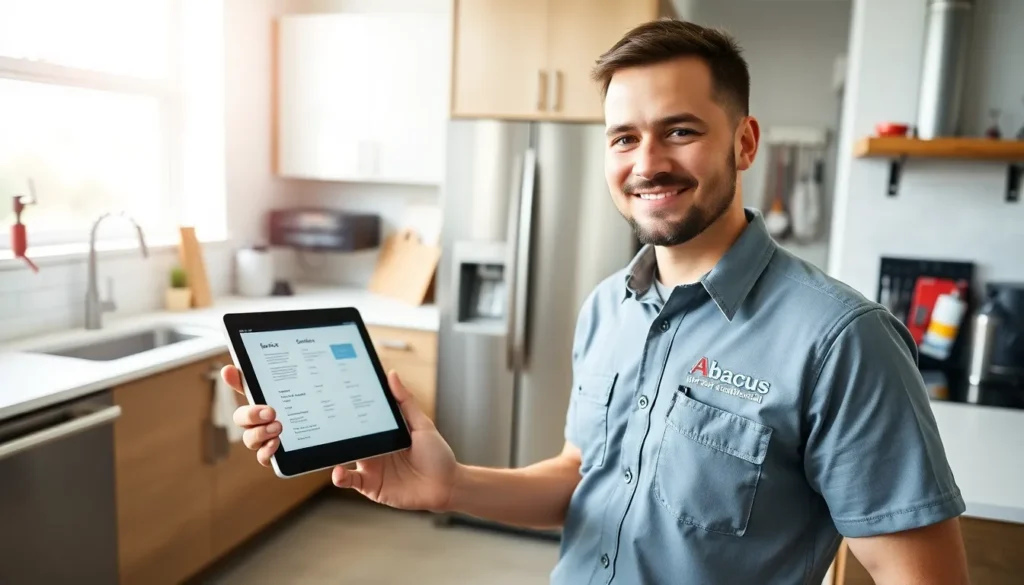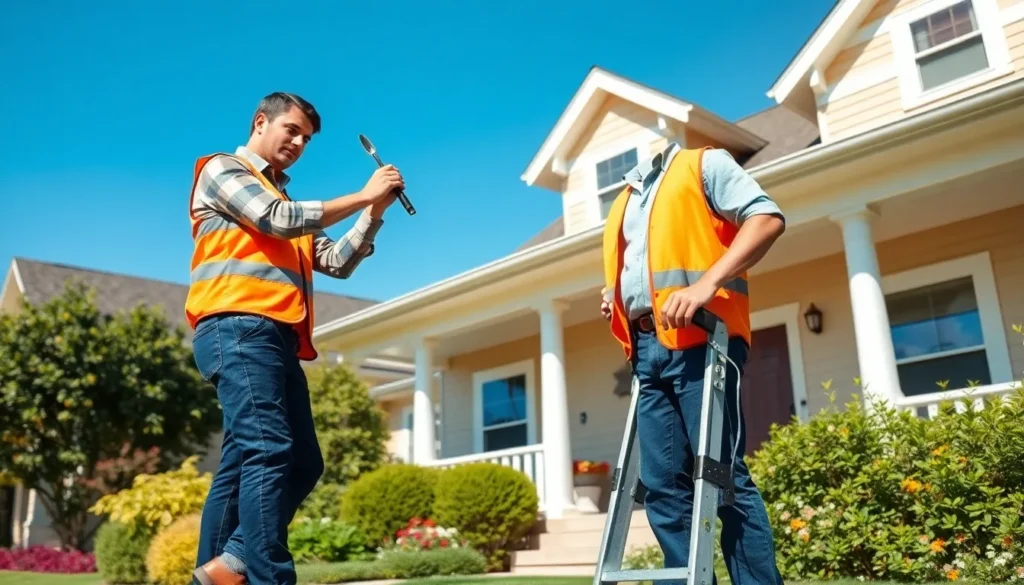Imagine walking into your home and having it greet you like an old friend. With smart home installation services, that dream can become a reality. These services transform ordinary spaces into high-tech havens where lights dim, coffee brews, and the thermostat knows just how you like it—without you lifting a finger. It’s like having a personal assistant who never takes a coffee break.
Table of Contents
ToggleOverview of Smart Home Installation Services
Smart home installation services transform regular homes into efficient automated environments. Professionals in this field specialize in integrating various smart devices to enhance convenience and security. Features such as automated lighting, smart thermostats, and security cameras work together seamlessly.
Control of these devices often occurs through a centralized smart hub or mobile application. Many homeowners prefer this setup for the ease of monitoring and adjustment. Installation typically begins with an assessment of the home environment and desired functionalities. Experts recommend mapping out needs before beginning the installation process.
Services frequently include selecting the right devices to fit individual preferences and budgets. Technicians provide recommendations based on the latest technology trends and device compatibility. Installation involves connecting devices to a home network, ensuring they communicate effectively. Support services often accompany installations, offering troubleshooting and maintenance options.
While some may consider a DIY approach, professional installation guarantees optimal performance and security. Many providers offer warranties on their services and equipment, adding peace of mind for users. Increased energy efficiency emerges as a significant advantage of smart home systems, helping homeowners save on utility bills.
Expect installers to provide training on interfacing with the new devices. The goal focuses on making technology accessible and user-friendly. These services cater to various needs, from simple device connections to comprehensive home automation systems.
Benefits of Smart Home Installation
Smart home installation offers multiple benefits that enhance daily living. These advantages include convenience, energy efficiency, and enhanced security.
Convenience and Comfort
Automated systems streamline daily routines, allowing homeowners to control lighting, temperature, and appliances with a simple command. Smart devices interact, adjusting settings based on individual preferences. Users can schedule routines, such as dimming lights at bedtime and brewing coffee in the morning. Voice-controlled assistants make seeking information or executing tasks effortless. Family members find comfort in personalized environments tailored to their needs.
Energy Efficiency
Smart home installation promotes significant energy savings, contributing to lower utility bills. Smart thermostats optimize heating and cooling, learning patterns to adjust settings accordingly. Automated lighting systems activate only when needed, reducing energy waste. Homeowners can monitor energy usage through dedicated apps, ensuring informed decisions on consumption. Overall, these technologies create a more sustainable living environment.
Enhanced Security
Smart home systems improve overall security by integrating advanced monitoring tools. Security cameras, motion detectors, and alarm systems work together to provide real-time alerts. Homeowners can remotely access video feeds, offering peace of mind when away. Smart locks allow for keyless entry, enhancing convenience and safety. Automating lights to mimic presence can deter potential intruders, further protecting the home.
Types of Smart Home Devices
Smart home devices enhance living environments by automating everyday tasks. A variety of options exist, each designed to increase convenience, security, and energy efficiency.
Smart Lighting
Smart lighting systems allow users to control illumination through apps or voice commands. Adjustable brightness and color settings cater to individual preferences and moods. Schedule lights to turn on or off at specific times, enhancing security when away from home. Many systems integrate with sensors, so they automatically adjust based on occupancy. Popular examples include Philips Hue and LIFX, offering extensive customization options and energy savings.
Smart Thermostats
Smart thermostats learn user habits and adjust heating and cooling automatically. They provide data on energy usage, enabling homeowners to make informed decisions. Remote access through smartphone apps allows adjustments on the go, ensuring comfort upon arrival. Some models, like the Nest Thermostat and Ecobee, offer features such as geofencing, which detects when residents are home or away. These devices contribute to significant energy savings, making homes more efficient.
Smart Security Systems
Smart security systems offer advanced monitoring and control over home safety. Features include real-time alerts, video surveillance, and remote access to camera feeds. Smart doorbells like Ring allow users to see and communicate with visitors from anywhere. Security cameras integrate with mobile apps, providing peace of mind through instant notifications. Systems often include smart locks that enable keyless entry, enhancing security while eliminating the need for physical keys. Popular brands include Arlo and August, offering reliable protection for any home.
Choosing the Right Installation Service
Selecting a smart home installation service involves assessing multiple factors, ensuring the chosen provider aligns with specific needs and expectations.
Experience and Expertise
Experience plays a crucial role in determining the quality of installation services. Look for professionals with a proven track record in smart home technology. They should possess certifications and training relevant to various devices and systems. Reliable installers understand the nuances of integrating multiple devices, making them essential for seamless operation. Expertise in troubleshooting common issues enhances trust, ensuring homeowners feel confident in their investment. Assess the length of time a service provider has been in the industry. Longevity often correlates with a strong understanding of evolving technology trends and homeowner demands.
Customer Reviews and Testimonials
Customer reviews provide insight into the quality of service received by others. A high volume of positive testimonials indicates a reliable installation service. Check platforms like Google and Yelp for unbiased feedback, helping to gauge overall customer satisfaction. Pay attention to recurring themes in reviews, such as responsiveness, professionalism, and post-installation support. Engaging with previous clients through direct testimonials can further clarify what to expect. Recommendations from family and friends also carry weight, reflecting real-world experiences and offering additional layers of assurance. Prioritize services with consistently positive feedback to ensure a supportive installation experience.
Common Challenges in Smart Home Installation
Smart home installation often presents several challenges. Understanding these obstacles can enhance the overall experience.
Compatibility Issues
Compatibility poses a significant concern during installation. Not every smart device works seamlessly with every system. Homeowners must ensure that chosen devices are compatible with existing technology. For instance, some smart hubs only support specific brands or protocols. This limitation can lead to frustration when attempting to integrate older devices with newer technology. Researching device specifications ahead of time prevents potential compatibility problems. Consulting with installation professionals can clarify which devices integrate well together. Addressing compatibility early reduces the likelihood of unexpected surprises later in the process.
Network Connectivity
Network connectivity plays a critical role in smart home functionality. A robust and stable internet connection is essential for optimal performance. Weak signals can cause devices to lag or disconnect, disrupting automation routines. Ensuring strong Wi-Fi coverage throughout the home mitigates these issues. Homeowners might need to consider mesh networks or Wi-Fi extenders to enhance signal strength in larger spaces. Installation professionals often recommend testing internet speeds before setting up devices. Properly configured networks provide reliable communication between devices, enhancing overall system efficiency. Taking steps to secure the network also protects sensitive information and improves device performance.
Smart home installation services offer a transformative way to enhance everyday living. By integrating advanced technology into homes, they provide convenience, energy efficiency, and increased security. Homeowners can enjoy the benefits of automation while having access to professional support and training.
Choosing the right installation service is crucial for a seamless experience. With the right expertise and understanding of individual needs, homeowners can create a smart environment tailored to their lifestyle. As smart technology continues to evolve, embracing these services can lead to a more comfortable and efficient home.









